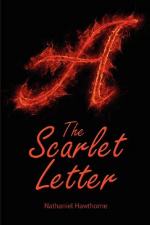Hester sought not to acquire anything beyond a subsistence, of the plainest and most ascetic description, for herself, and a simple abundance for her child. Her own dress was of the coarsest materials and the most sombre hue, with only that one ornament—the scarlet letter—which it was her doom to wear. The child’s attire, on the other hand, was distinguished by a fanciful, or, we may rather say, a fantastic ingenuity, which served, indeed, to heighten the airy charm that early began to develop itself in the little girl, but which appeared to have also a deeper meaning. We may speak further of it hereafter. Except for that small expenditure in the decoration of her infant, Hester bestowed all her superfluous means in charity, on wretches less miserable than herself, and who not unfrequently insulted the hand that fed them. Much of the time, which she might readily have applied to the better efforts of her art, she employed in making coarse garments for the poor. It is probable that there was an idea of penance in this mode of occupation, and that she offered up a real sacrifice of enjoyment in devoting so many hours to such rude handiwork. She had in her nature a rich, voluptuous, Oriental characteristic—a taste for the gorgeously beautiful, which, save in the exquisite productions of her needle, found nothing else, in all the possibilities of her life, to exercise itself upon. Women derive a pleasure, incomprehensible to the other sex, from the delicate toil of the needle. To Hester Prynne it might have been a mode of expressing, and therefore soothing, the passion of her life. Like all other joys, she rejected it as sin. This morbid meddling of conscience with an immaterial matter betokened, it is to be feared, no genuine and steadfast penitence, but something doubtful, something that might be deeply wrong beneath.
In this manner, Hester Prynne came to have a part to perform in the world. With her native energy of character and rare capacity, it could not entirely cast her off, although it had set a mark upon her, more intolerable to a woman’s heart than that which branded the brow of Cain. In all her intercourse with society, however, there was nothing that made her feel as if she belonged to it. Every gesture, every word, and even the silence of those with whom she came in contact, implied, and often expressed, that she was banished, and as much alone as if she inhabited another sphere, or communicated with the common nature by other organs and senses than the rest of human kind. She stood apart from mortal interests, yet close beside them, like a ghost that revisits the familiar fireside, and can no longer make itself seen or felt; no more smile with the household joy, nor mourn with the kindred sorrow; or, should it succeed in manifesting its forbidden sympathy, awakening only terror and horrible repugnance. These emotions, in fact, and its bitterest scorn besides, seemed to be the sole portion that she retained




